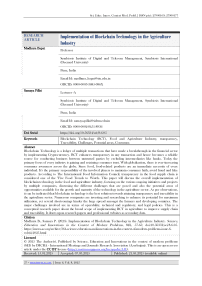Implementation of Blockchain Technology in the Agriculture Industry
Автор: Madhura B., Samaya P.
Журнал: Science, Education and Innovations in the Context of Modern Problems @imcra
Статья в выпуске: 6 vol.8, 2025 года.
Бесплатный доступ
Blockchain Technology is a ledger of multiple transactions that have made a breakthrough in the financial sector by implementing Cryptocurrency. BCT enhances transparency in any transaction and hence becomes a reliable source for conducting business between untrusted parties by excluding intermediaries like banks. Today the primary focus of every industry is gaining and retaining consumer trust. With globalization, there is ever-increasing consumer awareness across the globe. Since food, food-related products are an immediate necessity of every individual. It's the primary responsibility of the involved players to maintain consumer faith, avoid fraud and fake products. According to The International Food Information Council, transparency in the food supply chain is considered one of the "Five Food Trends to Watch. This paper will discuss the overall implementation of blockchain technology in the food and agriculture industry, focusing on the various ongoing initiatives and projects by multiple companies, discussing the different challenges that are posed and also the potential areas of opportunities available for the growth and maturity of the technology in the agriculture sector. As per observations, it can be indicated that blockchain technology is the best solution towards attaining transparency and traceability in the agriculture sector. Numerous companies are investing and researching to enhance its potential for maximum utilization, yet several shortcomings hinder the large spread amongst the farmers and developing countries. The major challenges involved are in terms of operability, technical and regulatory, and legal policies. This is a conceptual research paper about the broad scope of implementing BCT in agriculture to improve supply chain and traceability. It draws upon research papers and professional websites as secondary data.
Blockchain Technology (BCT), Food and Agriculture Industry, transparency, Traceability, Challenges, Potential areas, Consumer
Короткий адрес: https://sciup.org/16010744
IDR: 16010744 | DOI: 10.56334/sei/8.6.05
Текст научной статьи Implementation of Blockchain Technology in the Agriculture Industry
RESEARCH ARTICLE Implementation of Blockchain Technology in the Agriculture Industry Madhura Bapat Professor Symbiosis Institute of Digital and Telecom Management, Symbiosis International (Deemed University) / / < Pune, India Email Id: ORCID: 0000-0003-3685-086X / Samaya Pillai Lecturer -A Symbiosis Institute of Digital and Telecom Management, Symbiosis International (Deemed University) / Pune, India Email Id: ORCID: 0000-0002-8451-8936 Doi Serial Keywords Blockchain Technology (BCT), Food and Agriculture Industry, transparency, Traceability, Challenges, Potential areas, Consumer.
Madhura B., Samaya P. (2025). Implementation of Blockchain Technology in the Agriculture Industry. Science, Education and Innovations in the Context of Modern Problems, 8(6), 57-65; doi:10.56352/sei/8.6.05.
In India, agriculture is the primary source of livelihood for about 58 percent of the population. It is the third-largest contributor to the Indian GDP, with around 16% [2]. Although the agriculture sector is one of the most crucial industries, the farmers often face several challenges caused by various factors such as 1) Lack of Access to advanced farming techniques 2) Lack of storage facilities, 3) Inefficient and non-transparent distribution network, 4) Lack of awareness and education amongst the farmers 5) unreliable climatic conditions, 6) Lack of transparency in the supply chain, 7) inadequate appreciation of prices [3].
With the advent of digitization, multiple attempts have been made to improve production and supply chain management. Yet, due to extreme human intervention, there is a lack of trust amongst the producers and consumers. Due to globalization, the market competition has scaled up and has led to a complex supply chain. This creates several problems such as food traceability, food quality and its safety, supply chain inefficiency [1]. These all-in turn cause risks to the economy and human health.
Since the introduction of Blockchain, it has been mainly used for cryptocurrency transactions because of its open, distributed, and tamperproof ledgers that record the transactions between two parties and keep the data permanent and certifiable. As per a forecast by Gartner, by the year 2030, there would be an annual business value of more than the US $3 million created by Blockchain. So, around 10%-20% of the global economic infrastructure would be based on a blockchain system [4].
Agriculture is one major sector in India that could benefit tremendously from the implementation of Blockchain. Here, the study will focus on the various sectors in agriculture wherein the implementation of Blockchain would be beneficial using the following concepts:
-
• The emergence and the concept of Blockchain
-
• Blockchain in agriculture and applications
-
• Need for Safety and Awareness in Agriculture and Food
-
• Upcoming Areas for Blockchain in Agriculture
-
• Challenges and Drawbacks in the current market for BTC


